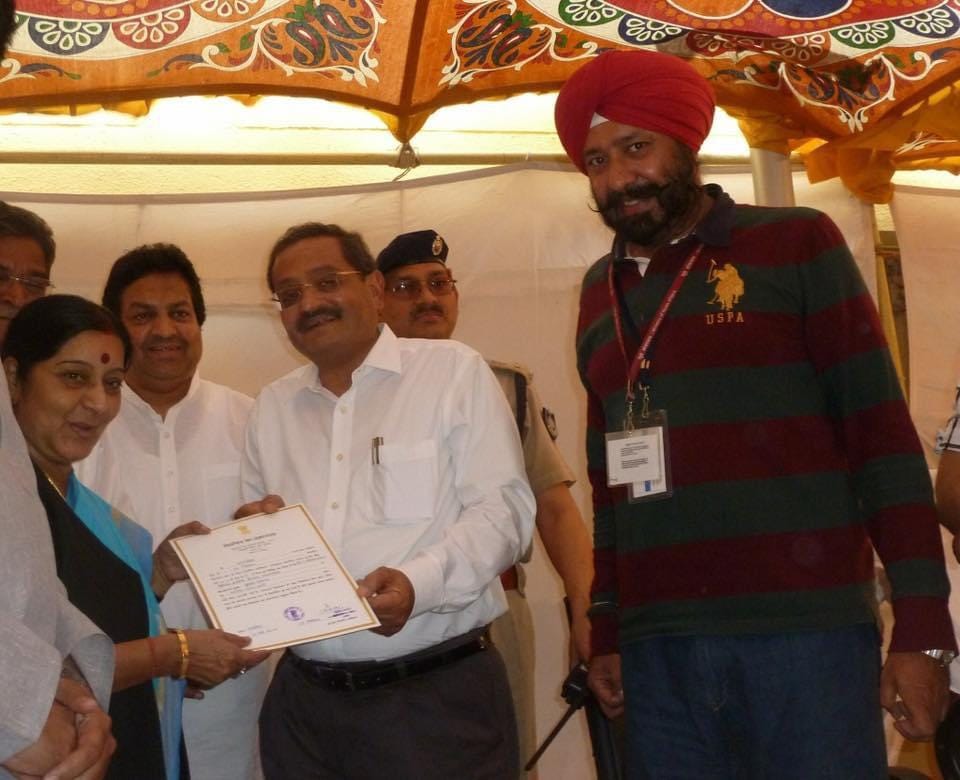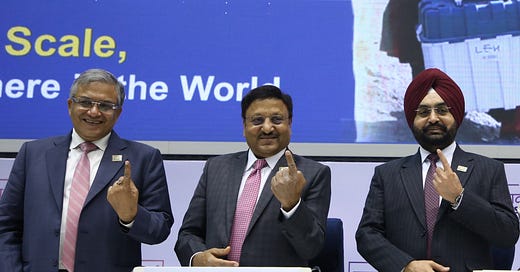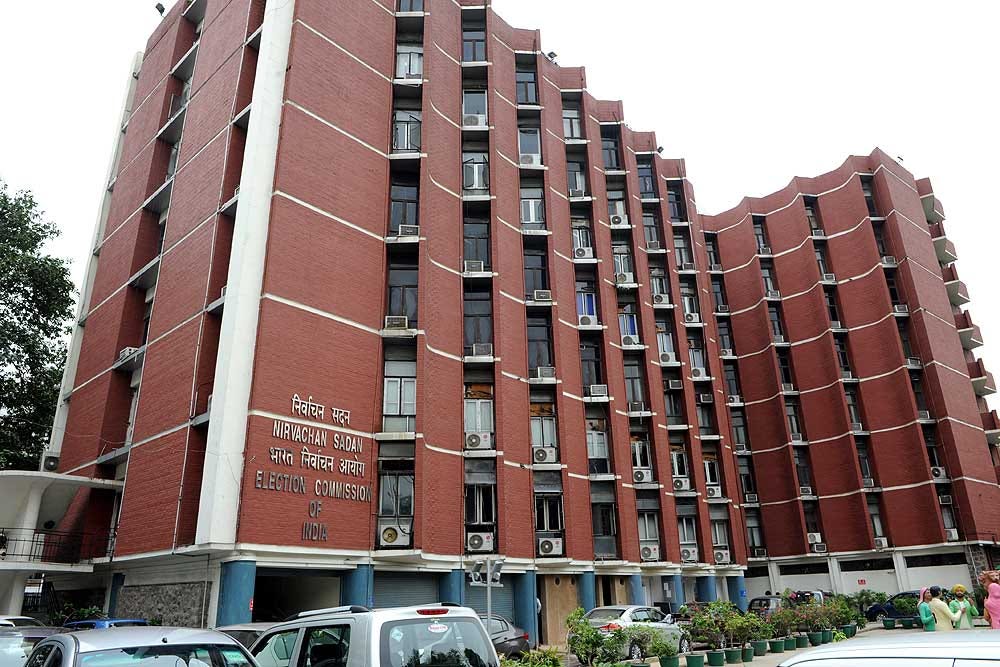Check Your EQ (Election Quotient)— our pithy Quiz
Take 10-point quiz to check how well-informed you are as a voter, and as a citizen.
Welcome to the Biggest Ever Democratic Exercise in the History of the World
Welcome to our quiz on the monumental event that marks the biggest democratic exercise in the world: the 2024 Lok Sabha elections in India. With nearly 100 crore eligible voters poised to cast their ballots across the length and breadth of the country, this election stands as a testament to the vibrant and robust democracy that India is. Spanning seven phases, the electoral process culminates in the counting of votes on 4th June 2024, an eagerly anticipated date that will decide the direction of the nation for the next five years.
This quiz aims to enhance your understanding of the electoral process, the roles and responsibilities of various stakeholders, and the rules that ensure fairness and transparency. So, let's embark on this journey of discovery together, celebrating the spirit of democracy that empowers every voter to shape the future of India.
Question 1:
"Is it mandatory for a candidate to be a registered voter in a specific state in order to contest for a Lok Sabha seat from any constituency within that state?"
Answer:
No, it is not mandatory for a person to be a registered voter in a particular state to contest for a Lok Sabha seat from any constituency within that state. According to the Representation of the People Act, 1951, a candidate must be a registered voter from any constituency in India. However, there is no requirement for the candidate to be registered specifically in the constituency or even in the state from which they intend to contest the Lok Sabha elections. This flexibility allows for a wider pool of candidates to participate in the electoral process, ensuring that political parties can field candidates who, they believe, are best suited to represent a particular constituency, even if those candidates do not have a direct electoral connection to that area through voter registration.
Question 2:
"Is the minimum age requirement for qualifying as a Lok Sabha candidate set at 21 years? Additionally, is there a maximum age limit imposed for candidates?"
Answer:
The minimum age required to qualify as a candidate for the Lok Sabha is 25 years, not 21. The Constitution of India specifies that a person must be at least 25 years of age to be eligible to contest in the Lok Sabha elections. There is no maximum age limit for candidates contesting for the Lok Sabha. This age criterion ensures that candidates have attained a certain level of maturity and experience before they are given the responsibility of representing their constituents in the lower house of the Parliament. The absence of a maximum age limit allows for the inclusion of experienced individuals who can bring their knowledge and expertise to the legislative process.
Question 3:
"What is the procedure followed if a candidate passes away after the final list of contesting candidates has been approved by the Returning Officer?"
Answer:
If a candidate dies after the list of contesting candidates has been finalised but before the polls are conducted, the election for that particular constituency is countermanded (cancelled) by the Election Commission of India. This process involves postponing the election to a later date to allow the concerned political party (if the candidate was representing one) to nominate a new candidate. The nomination and campaigning processes are restarted to accommodate this change. This rule is in place to ensure that political parties and voters are not unduly disadvantaged by the unforeseen demise of a candidate. The new election date is announced by the Election Commission, giving adequate time for the revised campaigning and nomination processes. This procedure underscores the fairness and inclusivity of the electoral process, allowing parties and voters to make informed choices under unexpected circumstances.
Question 4:
"Is it permissible for an individual to contest elections from two different constituencies, and what are the consequences if they win in both?"
Answer:
Yes, the laws governing elections in India allow a person to contest from two different constituencies in the same general or state elections. This provision is contained within the Representation of the People Act, 1951. However, if a candidate wins from both constituencies, they must vacate one of the seats within a stipulated time frame, as per the rules set by the Election Commission of India.
The necessity to vacate one of the seats arises because a single individual cannot simultaneously represent two constituencies in the legislature. After choosing which seat to retain, a by-election is conducted for the vacated constituency to ensure representation for its constituents. This process ensures that every constituency has its representation in the legislative body without being impacted by the outcome of candidates contesting multiple seats. The rationale behind allowing candidates to contest from two places is to provide a safety net in case they lose in one constituency but also leads to additional expenditure and effort in organizing by-elections.
Question 5:
"If a Returning Officer rejects a nomination paper, what recourse is available to the aggrieved candidate?"
Answer:
If a nomination paper is rejected by the Returning Officer, the aggrieved candidate has the option to file an “Election Petition” against this decision in the appropriate High Court. The petition must be filed promptly, as the electoral timeline is strict, and any delay might affect the candidate's ability to contest in the election. In absence of a stay order, which is generally the norm, the election process is NOT held in abeyance.
The legal framework provides this recourse to ensure fairness and transparency in the electoral process. The High Court reviews the case to determine if the rejection was in accordance with the law and the guidelines set by the Election Commission of India. If the court finds that the Returning Officer's decision to reject the nomination was unjustified, it can order order a fresh election after the reinstatement of the candidate's nomination.
This judicial remedy ensures that candidates have a fair chance to contest elections and that their nominations are not unduly rejected, safeguarding the democratic process and ensuring that electoral disputes are resolved judiciously.

Question 6:
"After the Returning Officer has declared the election results, does the Election Commission possess the authority to annul this declaration? If not, what legal avenues are available to a contesting candidate who believes they have been wronged by the election process or result?"
Answer:
Once the Returning Officer has officially declared the results of an election, the Election Commission of India does not have the authority to annul that declaration directly. The declaration of results by the Returning Officer is considered final for that stage of the electoral process. However, this does not mean that aggrieved parties are without recourse if they believe there have been irregularities or legal violations in the conduct or outcome of the election.
Remedy for Aggrieved Contesting Candidate:
The primary legal recourse available to an aggrieved contesting candidate is to file an election petition challenging the election results. This petition is not filed with the Election Commission but rather must be submitted to the High Court of the state where the constituency is located, or in some cases, directly to the Supreme Court of India, depending on the nature of the election and the specific grounds of the challenge.
The grounds for filing an election petition can include but are not limited to, allegations of electoral fraud, malpractices, non-compliance with the election rules and regulations, and manipulation of vote counts. The judiciary then examines the merits of the case, and if it finds substantial evidence supporting the claims, it has the power to declare the election null and void, order a re-poll, or in some instances, declare the petitioner the winner.
This judicial review process ensures that the electoral process remains transparent, fair, and just, providing a mechanism to rectify errors or injustices that may have occurred during the election. It acts as a crucial safeguard for upholding the integrity of democratic elections.
Question 7:
"If I possess a voter ID card but discover my name is missing from the electoral roll on election day, what steps can I take to ensure I am able to cast my vote?"
Answer:
In the event you find your name missing from the electoral roll on election day despite having a voter ID card, the immediate step is to approach the polling station officials for assistance. Here are the actions you might consider:
Verify the Electoral Roll: Sometimes, names could be listed in a different part of the electoral roll or under a different polling station, especially if there have been recent changes in the electoral boundaries or if you have moved residence and updated your address. Ask the officials to check other sections of the roll or nearby polling stations' lists.
If not, there is really nothing that can be done at this stage. It is, therefore, recommended that you may, well in advance check your vote online. It’s free, simple and requires no login id.
Question 8:
"What is the role of an Election Observer, and do they have the authority to issue directions to the Returning Officer?"
Answer:
An Election Observer is an official appointed by the Election Commission of India to ensure that the election process is conducted fairly, transparently, and in accordance with the laid down rules and regulations. Observers can be deployed for both general and state assembly elections and come from various civil services, ensuring they have the necessary administrative experience and impartiality.
The primary responsibilities of an Election Observer include monitoring the election campaign, the conduct of the election on polling day, the counting process, and the adherence to the Model Code of Conduct. They are tasked with identifying any irregularities, malpractices, or violations of the election guidelines and reporting these to the Election Commission.
While Election Observers have significant monitoring and reporting roles, they do not have direct authority to issue orders to the Returning Officers, who are responsible for the conduct of elections at the constituency level. However, Observers can bring any issues to the attention of the Returning Officer and, if necessary, escalate them to the Election Commission for further action. They are “the eyes and ear of the Election Commission but are expected to keep their mouth shut.” The Election Commission, based on the reports from Observers, can then take appropriate actions, including giving directions to the Returning Officers.
This system ensures that while Observers play a critical role in ensuring the integrity of the election process, the administrative hierarchy and protocols are maintained, with the Election Commission retaining the ultimate authority over the conduct of elections.
Question 9:
"What are the procedures followed if a candidate passes away after the polling has concluded but before the counting of votes begins?"
Answer:
If a candidate dies after the polling has been completed but before the counting of votes begins, the election for that particular constituency is typically not immediately affected, and the counting process may proceed as scheduled. The key factor in determining the impact of a candidate's death on the election process is the timing of the death in relation to the electoral timeline.
In the event that the deceased candidate emerges victorious, the election for that constituency is declared void, necessitating a by-election to fill the vacancy. This by-election allows voters of the constituency to elect a new representative, as a candidate who has passed away cannot take office. The Election Commission of India would announce the schedule for this by-election, ensuring that the constituents are not left without representation due to the unforeseen event.
This approach balances the need to respect the electoral choices made by the voters up to the point of polling, with the practical necessity of ensuring that the elected representative is able to serve. It's a measure that upholds the integrity of the electoral process while dealing with the complexities introduced by such unforeseen circumstances.
Question 10:
"If a State Cabinet Minister files nominations to contest the Lok Sabha elections, should their nomination papers be rejected on the grounds of 'holding an office of profit'?"
Answer:
The concept of "office of profit" under the Indian Constitution prohibits Members of Parliament (MPs) and Members of the Legislative Assembly (MLAs) from holding any position that would give them a salary or perks from the government, aside from their official salary as an MP or MLA, to avoid any potential conflict of interest. However, the position of a State Cabinet Minister is not considered an "office of profit" under this definition when it comes to contesting elections for the Lok Sabha.
State Cabinet Ministers, by virtue of their position, do receive a salary and perks, but these are considered legitimate remuneration for their roles within the government, not as an "office of profit" that would disqualify them from being elected to the Lok Sabha. The law specifically exempts such positions from the definition of "office of profit" to ensure that sitting ministers and other similar officials can stand for election without having to resign from their current posts.
Therefore, a State Cabinet Minister filing nominations to contest the Lok Sabha elections would not have their nomination papers rejected on the grounds of holding an "office of profit." If elected, the individual would have to resign from their position as a State Cabinet Minister before officially taking up their role as a Lok Sabha member, in accordance with the rules governing the separation of powers and responsibilities between different levels of government.
Summing up and a “Call to Action”
We hope you found this quiz engaging and informative, providing valuable insights into the intricacies of India's electoral process. How much did you score, and did you find the information useful in enhancing your understanding of our democratic procedures? If you have any queries or need further clarification on any of the questions, please don't hesitate to leave them in the comments section. Remember, being not just a voter but an informed citizen plays a pivotal role in the strength and vitality of our democracy. Your awareness and participation contribute significantly to the democratic fabric of our nation, ensuring that we collectively move towards a more informed, transparent, and accountable governance system.
Share
If you think someone, within India or abroad, could benefit by reading this article, please do share.






